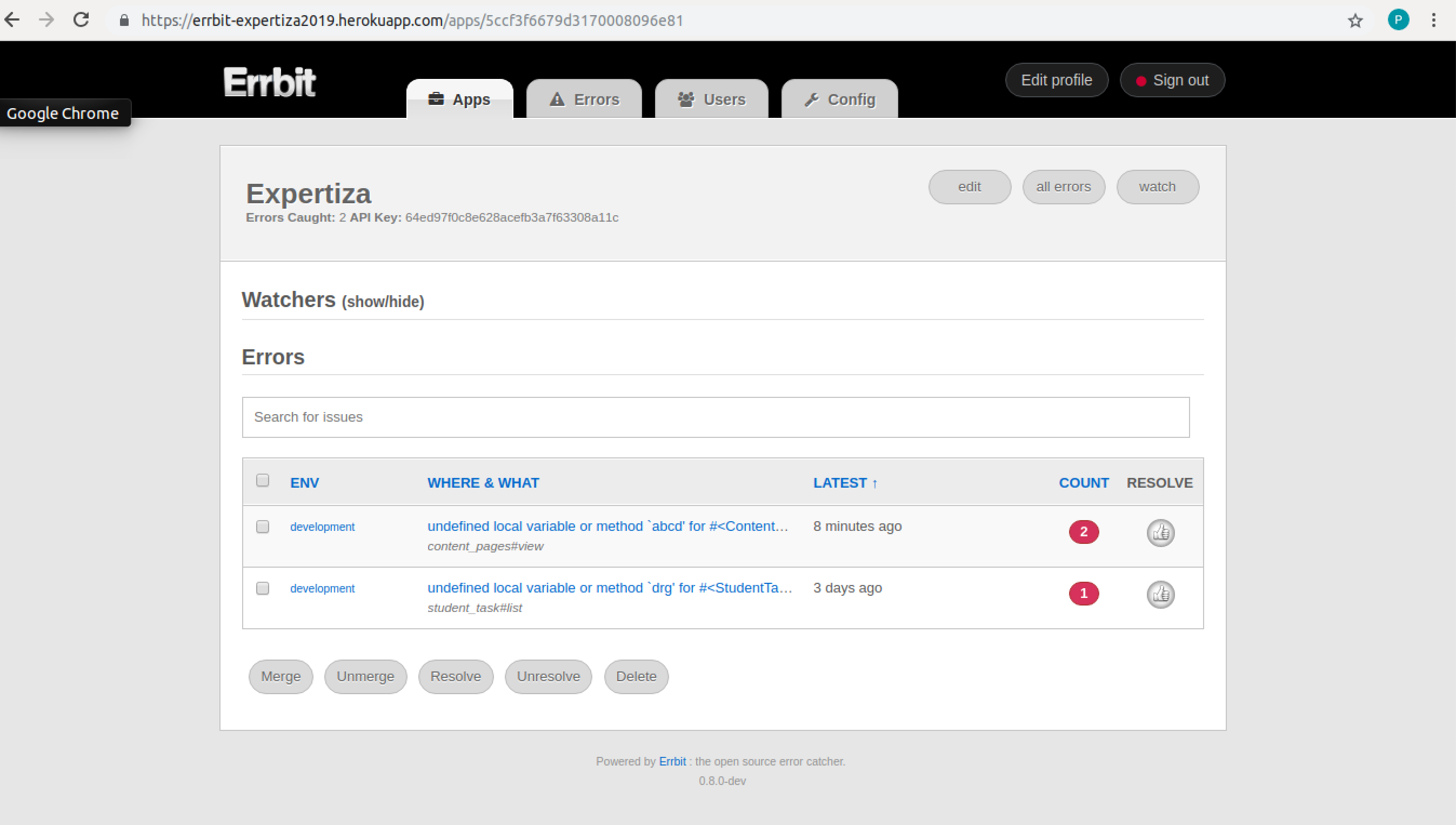Independent Study Spring 2019/Errbit: Difference between revisions
No edit summary |
No edit summary |
||
| (20 intermediate revisions by the same user not shown) | |||
| Line 1: | Line 1: | ||
=Set up an open-source error monitoring tool instead of Airbrake= | =Set up an open-source error monitoring tool instead of Airbrake= | ||
==Useful links== | ==Useful links== | ||
[ | [ Github Pull Request] | ||
[https://github.com/errbit/errbit Errbit] | [https://github.com/errbit/errbit Errbit] | ||
| Line 10: | Line 10: | ||
*Errbit is Airbrake API compliant | *Errbit is Airbrake API compliant | ||
*Store unresolved errors indefinitely without any extra cost. | *Store unresolved errors indefinitely without any extra cost. | ||
==Components== | |||
*Errbit | |||
*Expertiza | |||
*MongoDB | |||
==The Steps taken for the setup== | ==The Steps taken for the setup== | ||
| Line 15: | Line 20: | ||
'''Setup Heroku''' | '''Setup Heroku''' | ||
*Made | *Made a new Heroku account with the following credentails: | ||
Email: expertiza-support@lists.ncsu.edu | |||
Password: expertiza2019@ | |||
'''Setup Errbit''' | '''Setup Errbit''' | ||
*Fork Errbit | *Fork Errbit from https://github.com/errbit/errbit and follow the steps mentioned on [https://github.com/errbit/errbit/blob/master/README.md README.md] | ||
*When we run "rake db:seed" it will create an admin user with a random password. We can see these login credential in the console log. But instead, we can provide this username and password explicitly by just making some changes in errbit/db/seed.rb file. Eg: | |||
* | |||
'' | def admin_email | ||
return 'expertiza-support@lists.ncsu.edu' if heroku_pr_review_app? | |||
"expertiza-support@lists.ncsu.edu" | |||
end | |||
def admin_pass | |||
return 'errbit' if heroku_pr_review_app? | |||
@admin_pass ||= "errbit" | |||
end | |||
*Seed the DB (NOTE: No bootstrap task is used on Heroku!). | |||
heroku run rake db:seed | |||
===Deploy Errbit on Heroku=== | |||
To deploy Errbit on Heroku, so that we could configure it to catch errors for Expertiza, the following steps were taken: | |||
*Created a new empty application on Heroku and named it errbit-expertiza2019 | |||
*The app will have an associated empty git repository https://git.heroku.com/errbit-expertiza2019.git | |||
Took the following steps in the /errbit repository on local machine: | |||
*Login to Heroku using Herkou CLI from your console | |||
heroku login | |||
*Added remote | |||
heroku git:remote -a errbit-expertiza2019 | |||
*As errbit needs MongoDB database backend so need to install MongoDB addon in Heroku. We can use heroku command to create an addon. | |||
heroku addons:add mongolab:sandbox </br> | |||
heroku config:add HEROKU=true </br> | |||
To periodically clear resolved errors to free up space, With the cron add-on:Install the heroku cron addon, to clear resolved errors daily: | |||
heroku addons:add cron:daily | |||
Run the following to deploy. | |||
git add . | |||
git commit -m “new creds” | |||
git push heroku master | |||
'''Configure Expertiza to point to our deployed Errbit application | |||
*Create a new app on Errbit named Expertiza | |||
*Copy its configuration and place it in the expertiza/config/initializers/airbrake.rb file. | |||
Airbrake.configure do |config| | |||
config.host = 'https://errbit-expertiza2019.herokuapp.com' | |||
config.project_id = 1 # required, but any positive integer works | |||
config.project_key = '64ed97f0c8e628acefb3a7f63308a11c' | |||
config. | # Uncomment for Rails apps | ||
config.environment = Rails.env | |||
config.ignore_environments = %w(test) | |||
end | end | ||
On starting the server, the errors would now be caught by Errbit. | |||
'''Set up Cron job to regularly pull changes from upstream/master into the forked repository and deploy on Heroku.''' | |||
*Add the original GitHub repository as a "remote" called upstream to [https://github.com/errbit/errbit Errbit] | |||
*Add the empty Git repository made during app creation on Heroku as a "remote" called "production". | |||
In the .git/config, add: | |||
[remote "upstream"]¬ | |||
url = https://github.com/errbit/errbit.git¬ | |||
fetch = +refs/heads/*:refs/remotes/upstream/*¬ | |||
[remote "production"]¬ | |||
url = https://git.heroku.com/errbit-expertiza2019.git¬ | |||
fetch = +refs/heads/*:refs/remotes/heroku/*¬ | |||
*Setup tasks to fetch from upstream and rebase and then push to Heroku. | |||
*Task to migrate the database into production | |||
*To deploy using these tasks, run: | |||
rake deploy:production DEPLOY_BRANCH=production | |||
You could access the app using: | |||
https://errbit-expertiza2019.herokuapp.com/ | |||
UserName: expertiza-support@lists.ncsu.edu | |||
Password: errbit | |||
[[File: | ===Errbit Interface=== | ||
*Deployment of Errbit on Heroku, showing successful build. | |||
[[File:Build.png|frame|upright|center]] | |||
*Login to Errbit using the admin credentials we specified. | |||
[[File:ErrbitLogin.png|frame|upright|center]] | |||
*Create a new App on Errbit to catch Errors for Expertiza | |||
[[File:ExpertizaApp.png|frame|upright|center]] | |||
*Errors from Expertiza are caught in this manner and displayed. | |||
[[File:ErrorDetls.png|frame|upright|center]] | |||
*Similar errors are grouped together. | |||
[[File:ErrorsGroup.png|frame|upright|center]] | |||
Latest revision as of 14:39, 8 May 2019
Set up an open-source error monitoring tool instead of Airbrake
Useful links
[ Github Pull Request]
Purpose
Errbit has been set-up, replacing the already existing Airbrake API to serve several purposes like :
- Errbit is a much more powerful monitoring tool
- Errbit is Airbrake API compliant
- Store unresolved errors indefinitely without any extra cost.
Components
- Errbit
- Expertiza
- MongoDB
The Steps taken for the setup
There were several steps taken to set-up Errbit for Expertiza and schedule it to automatically pull changed from its forked branch and deploy:
Setup Heroku
- Made a new Heroku account with the following credentails:
Email: expertiza-support@lists.ncsu.edu Password: expertiza2019@
Setup Errbit
- Fork Errbit from https://github.com/errbit/errbit and follow the steps mentioned on README.md
- When we run "rake db:seed" it will create an admin user with a random password. We can see these login credential in the console log. But instead, we can provide this username and password explicitly by just making some changes in errbit/db/seed.rb file. Eg:
def admin_email
return 'expertiza-support@lists.ncsu.edu' if heroku_pr_review_app?
"expertiza-support@lists.ncsu.edu"
end
def admin_pass
return 'errbit' if heroku_pr_review_app?
@admin_pass ||= "errbit"
end
- Seed the DB (NOTE: No bootstrap task is used on Heroku!).
heroku run rake db:seed
Deploy Errbit on Heroku
To deploy Errbit on Heroku, so that we could configure it to catch errors for Expertiza, the following steps were taken:
- Created a new empty application on Heroku and named it errbit-expertiza2019
- The app will have an associated empty git repository https://git.heroku.com/errbit-expertiza2019.git
Took the following steps in the /errbit repository on local machine:
- Login to Heroku using Herkou CLI from your console
heroku login
- Added remote
heroku git:remote -a errbit-expertiza2019
- As errbit needs MongoDB database backend so need to install MongoDB addon in Heroku. We can use heroku command to create an addon.
heroku addons:add mongolab:sandbox
heroku config:add HEROKU=true
To periodically clear resolved errors to free up space, With the cron add-on:Install the heroku cron addon, to clear resolved errors daily:
heroku addons:add cron:daily
Run the following to deploy.
git add . git commit -m “new creds” git push heroku master
Configure Expertiza to point to our deployed Errbit application
- Create a new app on Errbit named Expertiza
- Copy its configuration and place it in the expertiza/config/initializers/airbrake.rb file.
Airbrake.configure do |config| config.host = 'https://errbit-expertiza2019.herokuapp.com' config.project_id = 1 # required, but any positive integer works config.project_key = '64ed97f0c8e628acefb3a7f63308a11c' # Uncomment for Rails apps config.environment = Rails.env config.ignore_environments = %w(test) end
On starting the server, the errors would now be caught by Errbit.
Set up Cron job to regularly pull changes from upstream/master into the forked repository and deploy on Heroku.
- Add the original GitHub repository as a "remote" called upstream to Errbit
- Add the empty Git repository made during app creation on Heroku as a "remote" called "production".
In the .git/config, add:
[remote "upstream"]¬
url = https://github.com/errbit/errbit.git¬
fetch = +refs/heads/*:refs/remotes/upstream/*¬
[remote "production"]¬
url = https://git.heroku.com/errbit-expertiza2019.git¬
fetch = +refs/heads/*:refs/remotes/heroku/*¬
- Setup tasks to fetch from upstream and rebase and then push to Heroku.
- Task to migrate the database into production
- To deploy using these tasks, run:
rake deploy:production DEPLOY_BRANCH=production
You could access the app using:
https://errbit-expertiza2019.herokuapp.com/ UserName: expertiza-support@lists.ncsu.edu Password: errbit
Errbit Interface
- Deployment of Errbit on Heroku, showing successful build.
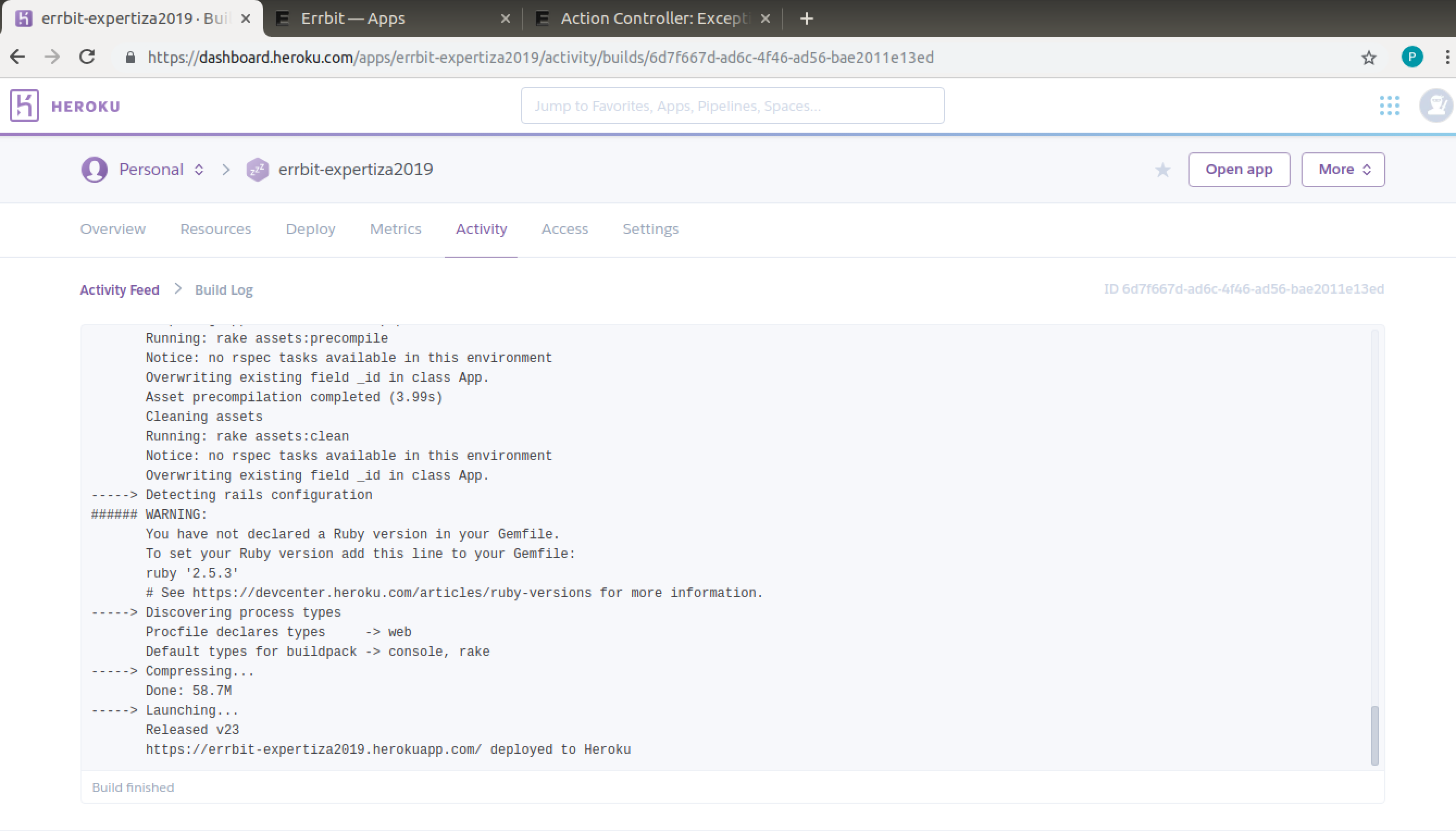
- Login to Errbit using the admin credentials we specified.
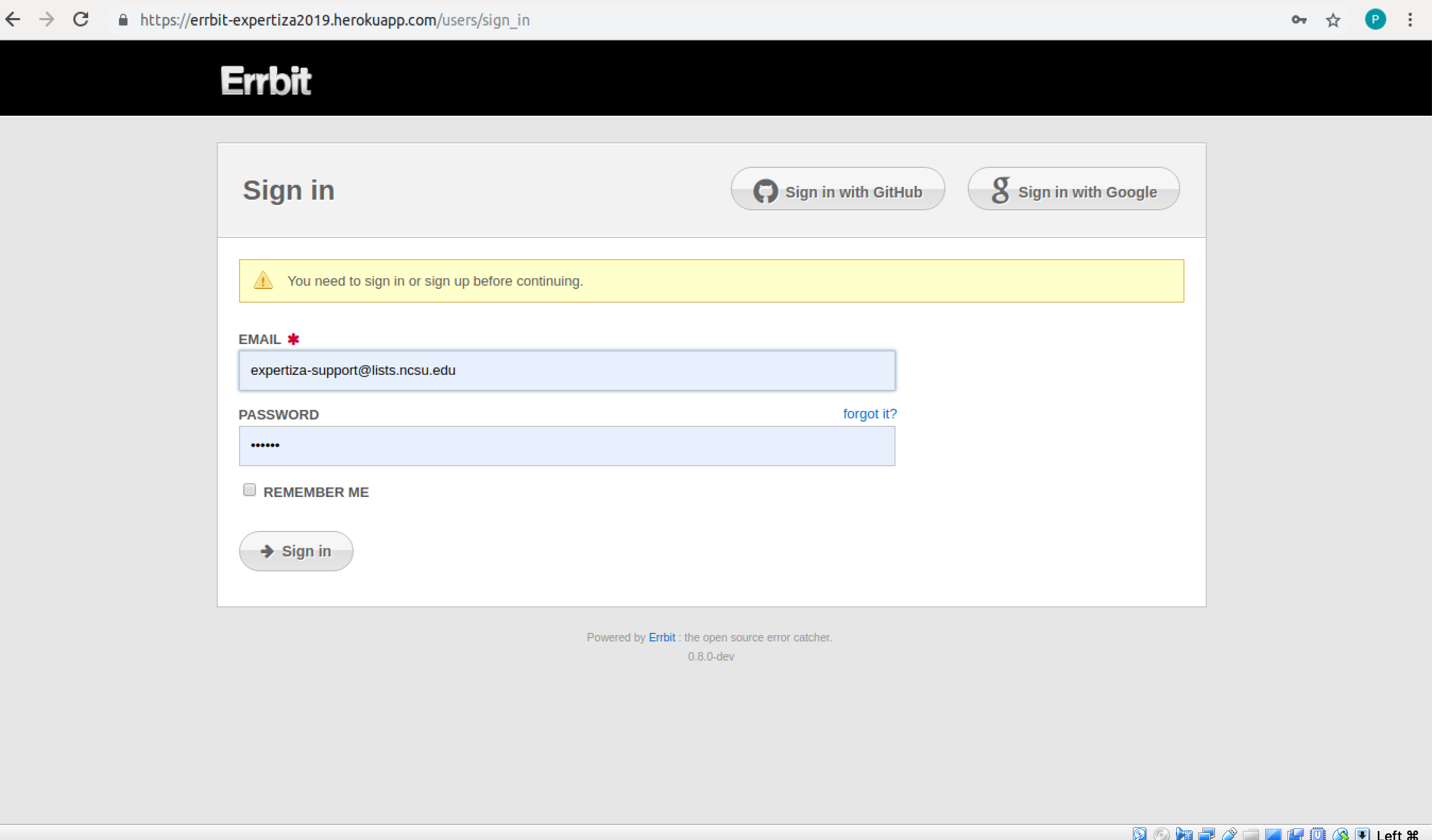
- Create a new App on Errbit to catch Errors for Expertiza
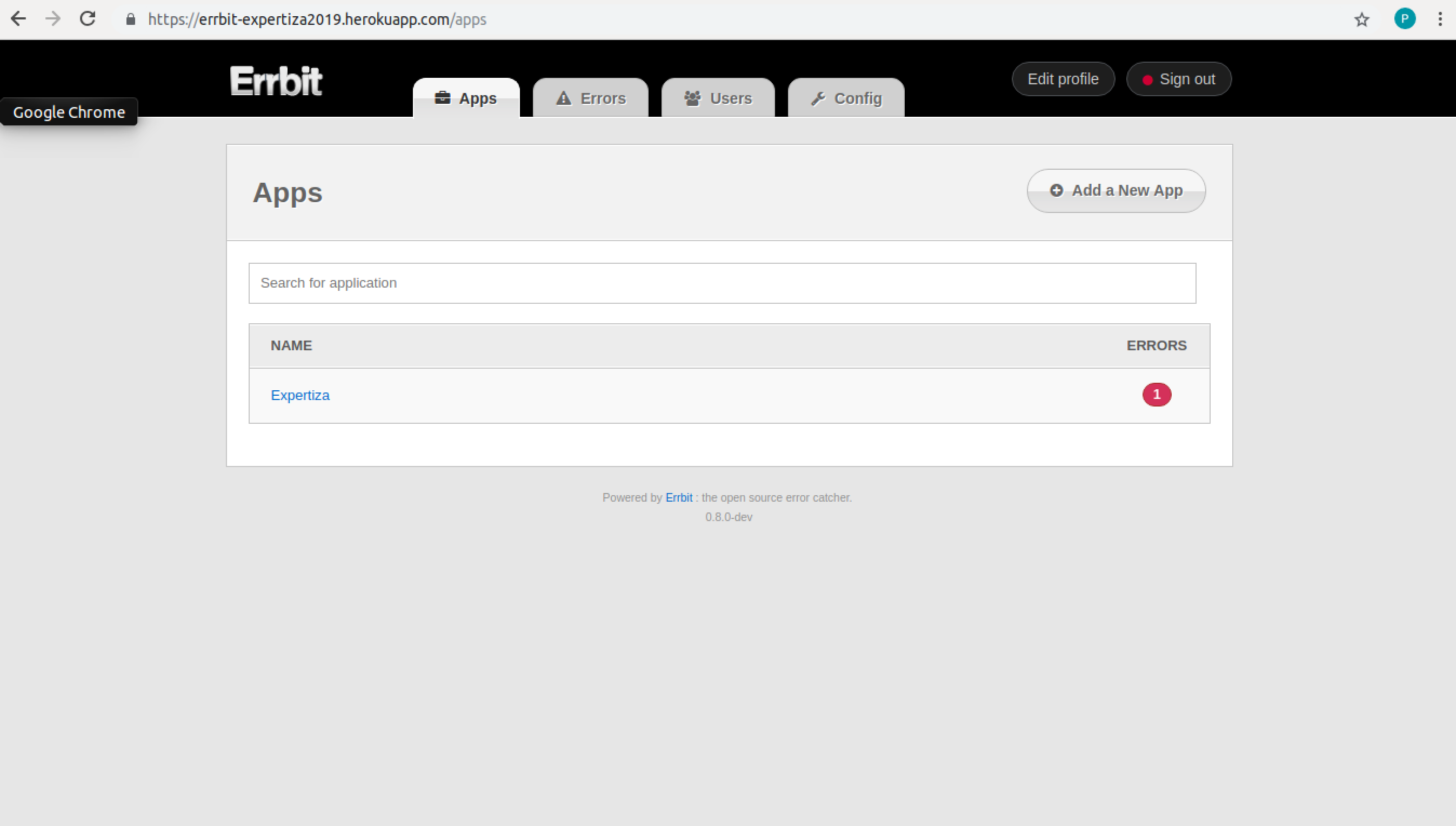
- Errors from Expertiza are caught in this manner and displayed.
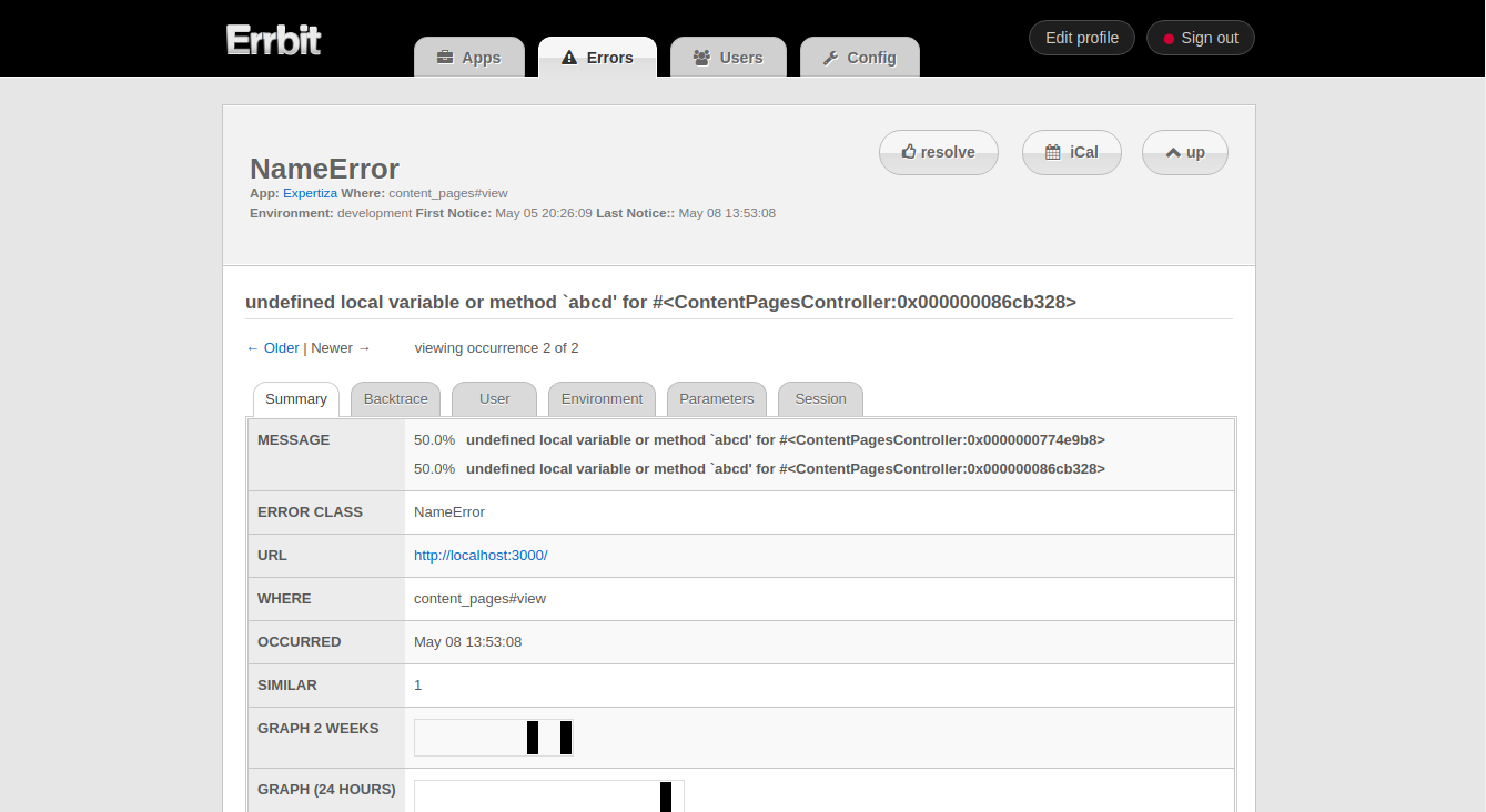
- Similar errors are grouped together.
